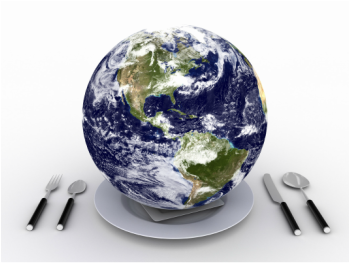Environmental Relationship with Food

Wake Up and Smell the Coffee
This is it. The alarm clock has sounded. It is now imperative that we awaken to the fact that we are all one — one with ourselves, one with each other, and one with the planet. It is time for us to ask the difficult questions: How will we care for ourselves? How will we care for the earth? Will we continue to plunder the earth’s natural resources, or will we recognize ourselves as a species among species and adopt environmentally sustainable lifestyle practices?
The Human Body as a Microcosm of the Earth
Only by entering into a mutually supportive relationship with the earth do we have any chance of saving it from ourselves. We can begin by celebrating the human body as a microcosm of the earth: Indeed, the human body is composed of the same elements in the same proportion as the earth: three quarters water and one quarter solid, organic and inorganic.
As an exercise in learning to experience our mutual dependency, imagine being pregnant with the earth, connected by a cosmological umbilical cord which both nourishes and removes waste. The Buddhist monk Thich Nhat Hahn has pointed out that “Even if you do not have a baby in your womb, the seed is already there. Even if you are not married, even if you are a man, you should be aware that a baby is already there, the seeds of future generations are already there.” Placing the earth within our body helps remind us of our intimate connection with the natural world, and our great interdependence upon it for survival. By returning to the womb, we awaken to the fact that the human survives only within the larger complex of ecosystems. Damage to any part of that system will eventually affect our physical, emotional, intellectual, and spiritual well-being.
Eating for Two: Gaía and You
Long ago, the Greeks called the earth Gaía. The Gaía hypothesis is an ecological theory which proposes that all living and nonliving things make up a single organism. Indeed, while the earth supplies us with fresh fruits and vegetables, whole grains and cereals, nuts and seeds, how we in turn shop, cook, serve and dispose of food has a great impact on the environment. Here are some steps you can take to begin a mutually loving and supportive relationship with the planet that supports and nourishes you!
This is it. The alarm clock has sounded. It is now imperative that we awaken to the fact that we are all one — one with ourselves, one with each other, and one with the planet. It is time for us to ask the difficult questions: How will we care for ourselves? How will we care for the earth? Will we continue to plunder the earth’s natural resources, or will we recognize ourselves as a species among species and adopt environmentally sustainable lifestyle practices?
The Human Body as a Microcosm of the Earth
Only by entering into a mutually supportive relationship with the earth do we have any chance of saving it from ourselves. We can begin by celebrating the human body as a microcosm of the earth: Indeed, the human body is composed of the same elements in the same proportion as the earth: three quarters water and one quarter solid, organic and inorganic.
As an exercise in learning to experience our mutual dependency, imagine being pregnant with the earth, connected by a cosmological umbilical cord which both nourishes and removes waste. The Buddhist monk Thich Nhat Hahn has pointed out that “Even if you do not have a baby in your womb, the seed is already there. Even if you are not married, even if you are a man, you should be aware that a baby is already there, the seeds of future generations are already there.” Placing the earth within our body helps remind us of our intimate connection with the natural world, and our great interdependence upon it for survival. By returning to the womb, we awaken to the fact that the human survives only within the larger complex of ecosystems. Damage to any part of that system will eventually affect our physical, emotional, intellectual, and spiritual well-being.
Eating for Two: Gaía and You
Long ago, the Greeks called the earth Gaía. The Gaía hypothesis is an ecological theory which proposes that all living and nonliving things make up a single organism. Indeed, while the earth supplies us with fresh fruits and vegetables, whole grains and cereals, nuts and seeds, how we in turn shop, cook, serve and dispose of food has a great impact on the environment. Here are some steps you can take to begin a mutually loving and supportive relationship with the planet that supports and nourishes you!
- Keep a grocery list to help limit the number of times that you need to visit the supermarket.
- Choose foods low on the food chain; that is, eat more plant foods such as fruits, vegetables, whole grains and nuts and seeds — and fewer animal foods which require more energy to sustain.
- Visit your farmer’s market where you can buy foods grown locally which require less transportation, packaging, and refrigeration.
- Carry reusable cloth or strong shopping bags. COMING SOON TO SACREDBITE.COM!
- Use ‘real’ plates, cups and utensils instead of disposable ones.
- Run the dishwasher only when it is full.
- Give thanks on a daily basis for the blessings of this bountiful earth and its continuous, unflagging support of all its inhabitants!